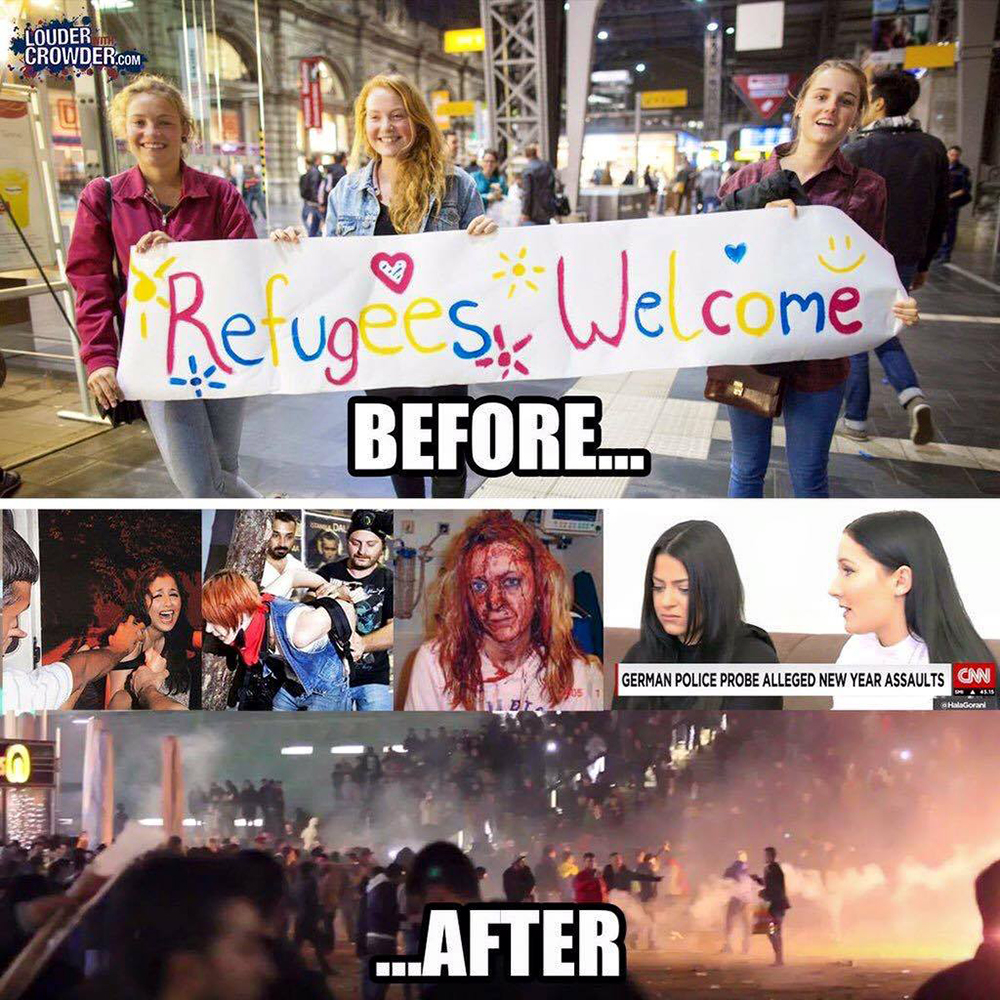Table of Contents
We’ve all seen the glowing images promulgated by the mainstream media: smiling German women and simpering Swedish soy-boys, holding signs declaring “Refugees welcome”. Because, you know, Europeans are just so morally superior to us Antipodean oiks. Where wicked Australia tries to shut the gate on a flood of boats, wonderful, welcoming Europe rolls out the red carpet.
The only Europeans who dare disagree are a tiny minority of neo-Nazis and other “far-right” figures.
But are Germans really so in love with their dusky, uninvited hordes?
When Angela Merkel unilaterally threw Europe’s borders open to millions of African and Middle-Eastern “refugees”, the media-political elite whipped themselves into an onanistic orgy of praise. They even made up a cutesy neologism: Wilkommenskultur. But have Germans really started hugging refugees als eine Gruppe?
A year later, the picture had changed dramatically. By the end of 2016, the public debate had shifted to focus on the so-called refugee crisis, or Flüchtlingskrise, alongside the religion of refugees and migrants, and limits to Germany’s capacity to integrate them. The change of perspective was reflected in discussions about upper limits – Obergrenzen — of the numbers of refugees that should be allowed to enter the country.

Ach nein! Such a situation would be a devastating blow to the left-elite’s cosy assumptions. Time for some damned lies and statistics.
Our recently published research suggests that welcome culture has never been as widely embedded in German society as public debates in 2015 would make us believe. But also that there was no widespread perception that Germany was undergoing a “refugee crisis” in 2016.
Three quarters of the German citizens we surveyed were initially sceptical about refugees and migrants. Yet, in line with other studies, we found most held strong humanitarian views.
Those facts are not mutually exclusive. As extensive research in Australia has found, Australians are sympathetic to those perceived as genuine refugees and legal migrants. But Australians take a very dim view of illegal economic migrants and fake “asylum seekers”. Germans seem little different.
But the researchers’ claim that there was no wave of German scepticism and hostility to Merkel’s migrants is undermined by their own data.
Two groups could be distinguished in 2015, as the graph below shows. The first and smaller group – 20% of our respondents – were rather approving of refugee homes in their vicinity, while the second and larger group of 80% was rather disapproving.
Still, both groups shared strong humanitarian views. They favoured refugees from Syria, affected by the tragic war in the Middle East, over refugees from other countries such as Nigeria. They also preferred families coming to Germany rather than single people.
And therein lie the issues. The hordes who flooded Europe, post-Merkel, were overwhelmingly single men. Syrians made up just 12% of first-time asylum applications.
Germans clearly have sympathy for genuine refugees. Equally clearly, Germans have judged that most of the millions of Africans and Middle-Easterners flooding their country are not genuine refugees. By last year, a strong majority of Germans “viewed asylum-seekers in a negative light”.
The rather disapproving group preferred non-Muslim to Muslim refugees, fewer refugees living in the accommodation, and a larger distance between the refugee home and their own home. In contrast, the rather approving group did not differentiate Muslim and non-Muslim refugees, were not concerned by the number of people living in the refugee homes, and approved if the refugees were to live close to their own home.
Remember, the “rather disapproving” group were by far the majority: 80% of Germans surveyed.
Overall, there was and still is today a mismatch between people’s views, the focus of political debates about refugees and media coverage of these issues.
The Conversation
As we clearly saw on New Year’s Eve, 2015, in cities across Germany. Thousands of German women were attacked, sexually assaulted and raped by gangs of Middle-Eastern and African men, operating with military precision via messaging apps. The immediate reaction from police and media was to lie and cover-up. Media tried to avoid reporting what had happened for days. Politicians instructed police to tone down their reports and remove the word “rape”.
Perhaps ironically, this report comes from a program in British universities supposedly designed to improve qualitative data use in sociology. It doesn’t seem to be working.
Please share this article so that others can discover The BFD






